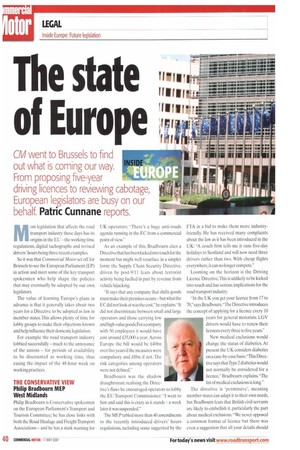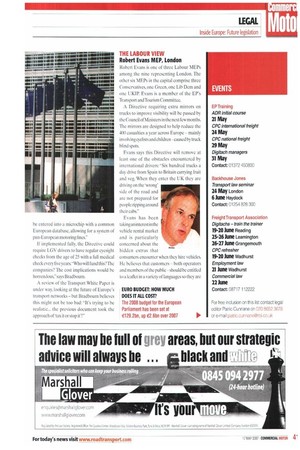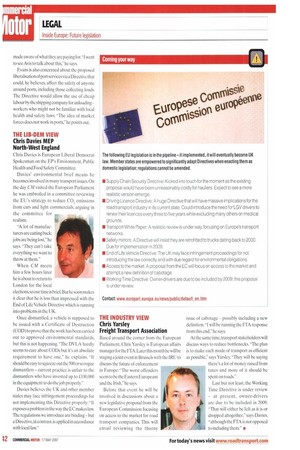The state of Europe
Page 40

Page 41

Page 42

If you've noticed an error in this article please click here to report it so we can fix it.
CM went to Brussels to find out what is coming our way.
From proposing five-year driving licences to reviewing cabotage, European legislators are busy on our
behalf. Patric Cunnane reports.
Most legislation that affects the road transport industry these days has its origins in the EU — the working time regulations, digital tachographs and revised drivers' hours being three recent examples.
So it was that Commercial Motor set off for Brussels to see the European Parliament (EP) in action and meet some of the key transport spokesmen who help shape the policies that may eventually be adopted by our own legislators.
The value of learning Europe's plans in advance is that it generally takes about two years for a Directive to be adopted as law in member states. This allows plenty of time for lobby groups to make their objections known and help influence their domestic legislation.
For example the road transport industry lobbied successfully — much to the annoyance of the unions — for periods of availability to be discounted as working time, thus easing the impact of the 48-hour week on working practices.
THE CONSERVATIVE VIEW Philip Bradbourn MEP West Midlands Philip B rad bourn is Conservative spokesman on the European Parliament's Transport and Tourism Committee; he has close links with both the Road Haulage and Freight Transport Associations — and he has a stark warning for UK operators: "There's a huge anti-roads agenda running in the EC from a commercial point of view."
As an example of this, Bradbourn cites a Directive that has been kicked into touch for the moment but might well resurface in a simpler form: the Supply Chain Security Directive, driven by post-9/1 I fears about terrorist activity being fuelled in part by revenue from vehicle hijacking.
"It says that any company that shifts goods must make their premises secure — but what the EC did not look at was the cost:he explains."It did not discriminate between small and large operators and those carrying low and high-value goods.For a company with 50 employees it would have cost around £35,000 a year. Across Europe the bill would be f.:40bn over five years if the measures were compulsory and Dibn if not. The risk categories among operators were not defined.
Bradbourn was the shadow draughtsman; realising the Directive's flaws he encouraged operators to lobby the EU Transport Commissioner: "I went to him and said this is crazy as it stands — a week later it was suspended."
The MEP tabled more than 40 amendments to the recently introduced drivers' hours regulations, including some suggested by the FTA in a bid to make them more industryfriendly. He has received many complaints about the law as it has been introduced in the UK: "A coach firm tells me it runs five-day holidays to Scotland and will now need three drivers rather than two. With cheap flights everywhere, it can no longer compete."
Looming on the horizon is the Driving Licence Directive.This is unlikely to be kicked into touch and has serious implications for the road transport industry.
"In the UK you get your licence from 17 to 70," says Bradbourn."The Directive introduces the concept of applying for a licence every 10 years for general motorists. LGV drivers would have to renew their licences every three to live years."
New medical exclusions would change the status of diabetics. At present the UK considers diabetics on a case-by-case basis."This Directive says thatType 2 diabetics would not normally be considered for a licence," Bradbourn explains. "The list of medical exclusions is long."
The directive is 'permissive', meaning member states can adapt it to their own needs, but Bradbourn fears that British civil servants are likely to embellish it, particularly the part about medical exclusions: "We never opposed a common format of licence but there was even a suggestion that all your details should be entered into a microchip with a common European database, allowing for a system of pan-European motoring fines.
If implemented fully, the Directive could require LGV drivers to have regular eyesight checks from the age of 25 with a full medical check every five years."Who will fund this? The companies? The cost implications would be horrendous," says Bradbourn.
A review of the Transport White Paper is under way, looking at the future of Europe's transport networks but Bradbourn believes this might not be too bad: "It's trying to be realistic.., the previous document took the approach of 'tax it or stop it'!"
THE LABOUR VIEW Robert Evans MEP, London
Robert Evans is one of three Labour MEPs among the nine representing London. The other six MEPs in the capital comprise three Conservatives, one Green, one Lib Dem and one UKIP. Evans is a member of the EP's Transport and Tourism Committee.
A Directive requiring extra mirrors on trucks to improve visibility will be passed by the Council of Ministers in the next few months. The mirrors are designed to help reduce the 400 casualties a year across Europe mainly involvingeyclists and children caused by truck blind spots.
Evans says this Directive will remove at least one of the obstacles encountered by international drivers: "Six hundred trucks a day drive from Spain to Britain carrying fruit and veg. When they enter the UK they are driving on the 'wrong' side of the road and are not prepared for people zipping around their cabs."
Evans has been takingan interest in the vehicle rental market and is particularly concerned about the hidden extras that consumers encounter when they hire vehicles. He believes that customers both operators and members of the publicshould be entitled to a leaflet in a variety of languages so they are made aware of what they are paying for."! went to see Avis to talk about this," he says.
Evans is also concerned about the proposed liberalisation of port services via a Directive that could, he believes, affect the safety of anyone around ports. including those collecting loads. The Directive would allow the use of cheap labour by the shipping company for unloadingworkers who might not be familiar with local health and safety laws. -The idea of market forces does not work in ports," he points out.
THE LIB-DEM VIEW Chris Davies MEP North-West England
Chris Davies is European Liberal Democrat Spokesman on the EP's Environment, Public Health and Food Safety Committee.
Davies' environmental brief means he becomes involved in many transport issues. On the day CM visited the European Parliament he was embroiled in a committee reviewing the EU's strategy to reduce CO, emissions from cars and light commercials, arguing in the committee for realism.
"A lot of manufacturers are cutting back; jobs are being lost," he says. "They can't take everything we want to throw at them."
When CM meets him a few hours later he is about to return to London for the local elections,so our time is brief. But he soon makes it clear that he is less than impressed with the End of Life Vehicle Directive which is running into problems in the UK.
Once dismantled, a vehicle is supposed to be issued with a Certificate of Destruction (COD) to prove that the work has been carried out to approved environmental standards, but this is not happening. "The DVLA hardly seems to care about CODs but it's an absolute requirement to have one," he explains. "It should be easy to squeeze out the 5(X) or so rogue dismantlers current practice is unfair to the dismantlers who have invested up to £100,000 in the equipment to do the job properly."
Davies believes the UK and other member states may face infringement proceedings for not implementing this Directive properly: "It exposes a problem in the way the EC makes law. The regulations we introduce are bindingbut a Directive,in contrast, is applied in accordance with local law."
THE INDUSTRY VIEW Chris Yarsley Freight Transport Association
Based around the corner from the European Parliament, Chris Yarsley is European affairs manager for the FTA. Later this month he will be staging a joint event in Brussels with the I RU to discuss the future of enforcement in Europe: "The worst offenders seem to be the Eastern Europeans and the Irish," he says.
Before that event he will be involved in discussions about a new legislative proposal from the European Commission focusing on access to the market for road transport companies. This will entail reviewing the thorny issue of cabotage possibly including a new definition. "I will be running the FTA response from this end," he says.
At the same time, transport stakeholders will discuss ways to reduce bottlenecks. The plan is to make each mode of transport as efficient as possible," says Yarsley. "They will be saying there's a lot of money raised from taxes and more of it should be spent on roads."
Last but not least, the Working Time Directive is under review at present, owner-drivers are due to be included in 2009. "That will either be left as it is or dropped altogether," says Davies, "although the FTA is not opposed to including them." •






























































































































































































